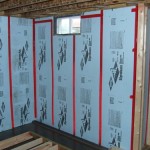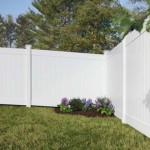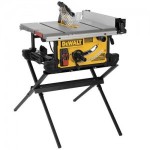Selecting TJI Floor Joist Sizes
Example Joist Selection
So here’s how you’d select a typical TJI floor joist from the span tables. Let’s assume we’re going to have a 15 foot span (fairly typically with a 30 ft wide house). Let’s also assume we want a very stiff floor so I’ll choose L/480 deflection criteria and 20 psf dead loading. I’ll also assume we’re going to frame the joists at 16 inches on center.
I’ve highlighted several key columns in the L/480 Span Table as you can see above. First off I’ve decided I want to try and use 11-7/8 inch deep joists (most standard size). Secondly I’m using the columns for 20 psf dead load fround on the right side of the table. Now all I did was pick the lightest (I’ll explain this below) TJI in the 11-7/8 inch depth that has an allowable span greater than my design of 15 ft. As you can see I’ve highlighted the TJI 110 (left column) that has an allowable span of 17′-8″ for a dead load of 20 psf and a deflection criteria of L/480.
The second column in the table identifies the TJI size for a given depth. The sizes range from lightest (110) to heaviest 560. Once you’ve selected a size be sure to check with our local supplier. Some of the sizes in the span tables are not always available. If that’s the situation, just pick the next biggest size and go with that.
Follow Standard Construction Details
Be sure you follow all of the recommended construction details in the design manual. The details ensure safety during and after construction. The details also help you build the floor to eliminate floor noises and performance issues.














how do you attach to concrete stem wall. it would be helpfull to have a picture for the want to build your own home person.i will soon be using this product.
Alan – Can you be more specific? Are you hanging the joists from the face of the wall or will the joists be sitting on top of the wall?
So, I am remodeling a garage (20′ ceiling) to add a second floor. My plan is to lag bolt 2×12’s to the existing studs in the walls and run TJI in hangers across the span. Is this ok? Anything I should be looking at?
Mark – You need to be sure you have proper bearing. Quite often you need more than 1-1/2″ of bearing.
The helpful TJI advice and related links much appreciated. Thanks!
I have a 24’x 24′ gabel roof garage with loft for storage. loft is made from 2″x 8″ joist spaning across 24′, 24″oc with 1/2″ plywood floor. Rafters are 2″x 6″ 24″ oc, set on 2″x 8″ ridge board, notched on to walls. the roof has 7-12 pitch. the joist sit on top of 2″x 4″ walls nailed to rafters. Walls are 8′ made of 2″x4″ 16″oc with double top plate. I would like to use the loft as a lounge possably adding a dormer on one side of the roof. What can I do to stengthen the joist and floor. I have thougth of sistering 2″x10″ to the 2″x8″ and adding one between ea. to make it 12″oc. Would this be enough. I’ve been told also to attach 2″x4″ to the joist and raffters about 6′ in, but that would kill the dormer. Could i just do it on one side and leave the other side open.
Is there a center support in the middle of the 24′ span? If not you’ll be hard pressed to span 24′ without using some serious TJI’s. You’d likely be better off removing the old joints one at a time and replacing with a properly sized TJI. However, the depth of them will be a concern. you may need to create a ledger and drop them down which ultimately drops your garage ceiling height down.
Any photos?
No center support. There is four to five inches clearance over the top of the overhead door. The ledger (to the wall?),sounds like it would work, how would I attach it, and what dimension. I have photos. I’ve subscribed via e-mail.
First off let me say you really need to work with a local building supplier or structural engineer to select the proper joist. Without knowing you entire situation and local building code requirements I can not give you a final solution.
However, just for talking purposes, if you look at the table you will see that you’ll need something like a TJI 230, 14″ deep, spaced at 12 inches on center. So then the challenge becomes how do you get them in place without the roof falling down! Honestly you’d be better off with a center column/beam arrangement.
My first floor is made up of 2×10 joist’s, that are 13′ long. The floor has some bounce in it, and I was hoping to eliminate some, if not all, of the bounce. One idea would be to glue and screw some 3/4″ plywood to every other joist, and then, add bracing every 4″. What do you think?
Thank You
That approach will definitely stiffen the floor. I’d install the plywood on every joist but just do the middle 8′ of the joists. This is where bending stresses are highest. Bridging will also help out quite a bit. This helps engage more than one joist when a load is applied to it.
Good luck.
Todd,
Thank you for the reply.
Should I just add the plywood to one side of the joist, or both? Should I jack the joist, before screwing and gluing the plywood? What type of plywood should I be using?
Thank You
From your description it should like you’re trying to fix “bouncing” of the floor. This is due to what we refer to as live load. So no jacking is required. Me personally I’d add plywood to both sides to keep things symetrical. I’d use 1/2″ thick CDX plywood.
When adding the plywood, to both sides of every other joist, should I just glue and screw both pieces to the middle of the joist, or should I stagger the pieces, on each side of the joist? Should I still add the plywood to every other joist? Do you think 3′ is a good space, for the bridging, or should it be more or less?
I would do every joist so the floor has an even distribution of stiffness. Not sure what you mean by staggering, I’d just use an 8′ long piece at mid-span, both sides of the web.
3′ is more than enough, 4′ spacing willl likely work well as well.
The strongest option is 1 or maybe 2 rows of bridge blocking. A 9 1/8″ plywood strip, even on both sides will not stiffen enough to stop live load deflection at length.
Hi Todd,
First off, thanks for putting this website together! Very helpful.
I am a home designer and have a question about TJI sizes/ spacing vs. cost. In your experience, is it less expensive to go with a tighter spacing with a lighter joist, or wider spacing with a heavier joist?
Regards, Larry
Typically the best solution is one that uses 16″ o.c. spacing. That spacing works well with 3/4″ sub-floors and finished flooring and it requires less labor than a 12″ o.c. spacing. Obviously there are times when that won’t work but that’s typically my preference.
I would like to confirm what floor joist will yield a strong floor. I will be 24 foot outside to outside of 2×6 exterior walls of a 42 foot long home and want to keep the first floor open by using TJI joists running right to left. I will have a 12/12 pitch roof so when I get upstairs there will be a vertical wall from center outwards, at 6 foot running from front to back and supporting a stick framed 2×8 rafter…or a 12 foot room the length of the house…so the load from the roof will essentially bear at 6 foot from the downstairs exterior walls inward if I am giving a proper mental image. I am in upstate NY and want the most rigid floor I can get within reason. I don’t want my daughter running back and forth and watching the floor/ceiling move before my eyes. I like to think of this as a heavy duty request/inquiry.
Earl – With a configuration like that you’ll need to confirm sizing with a TJI rep. Most distributors have staff that are trained to use their design software and confirm sizing. Taking a quick look at the charts you’re going to need a 14″ or 16″ deep joist. Spacing and model will depend on how much loading that upper wall framing adds to the span.
The deeper 14″ or 16″ joists will need to be accounted for in floor to floor heights for stair design and details.
Hi I have TJI 560 series 16 inch and 16oc spanning 21 ft I have a 16 inch rim boards. Do I need squash or web fillers at the top plates at the load ends. My tji are all cut tight to the rim board If I need them how would you apply in place. Glue then screw .this is for a second floor floor joist
Thanks
Frank – You’d have to look at their standard details. Typically we only see squash blocks at interior load bearing locations but it’s certainly possible. Installing them wouldn’t be a big deal, typically a vertical 2×4 on each side of the flange, tight to the plate below and tight to the sub-floor above would be used.
Todd,
I am looking at a cantilevered radius on the second floor. The projection at the widest point is about 36″. I am familiar with a doubled LVL at 1 1/2 times the cantilevered length inside the wall. I will turn the LVL beam at a 45 degree angle to the corner where the radius projects. Should I use LVL’s as floor joists? It doesn’t appear that a 14″ TGI will support the span.
Craig
Can you be more specific about the layout…not sure I really understand what you’re building.
I am thinking of remodeling my garage that is 23×25 with 17ft ceiling by adding a second floor for mostly storage…if I sandwich two 2×12 and lag bolt them to studs in the wall and use TJI in hangers would that be okay…and would it be beneficial to add 4×4 posts along the wall for support too…
Adam – Spans over 20′ are what I would consider a pretty significant span. Regardless of whether you’re using it for storage or finished space, you need to have someone evaluate that floor and size the joists properly. I’d work with your local lumber yard and have someone design the floor system. 2×12’s are not likely to work unless you install a beam at mid-span.
I need advice on the size, O.C/ TGI I will need to span 28′ with no carrying wall to support. (if possible)
Thank you
i am moving a mobile office with 2×8 24 in oc 3/12 pitch to 8500ft utah.i am going to add new roof same pitch metal rooring using tji construction. what bsize and spaceing would you recomend.
Jim – I can’t offer up that advice. You’ll need to work with your local lumber yard or a structural engineer that knows your local codes and the site conditions. Just not prudent for me to offer up structural advice in this type of forum. Good luck.
I’m building a 22’x62′ sugar house, half the building (22’x26′) will have a full basement, requiring a floor system. The building is post and beam construction, 10′ walls with a 8/12 pitched roof. the post and beam sections (the truss sections) are 13′ apart. the truss in the center spans the entire 22 width of the building – no beam or walls in the middle of the room (just a big empty space for kitchen and bottling equipment. the foundation will have 10″ walls giving the floor joists about 8″ of concrete to sit on. I thought of using TJIs to keep the floor stiff without the need for a support beam in the basement. do you think it is feasible and not a huge cost difference in using TJIs to span the 21’4″ span over using a support beam and 2×12’s? if so what type of TJI’s do you suggest?
Really comes down to the space you want in the basement. 21′ span isn’t a problem, but you’ll be buying heavier duty TJIs, especially if you’re got a heavy boiler on that floor. If you did one large LVL beam and regular size TJI’s it would likely be the most cost effective. The sizing really should be done by who you’re buying them from.
I have 24′ X 30′ foundation. Beam at the 15’mark. I am going to pour 2 inches of concrete on decking for radiant heat. I am able to purchase some TJI560 11 7/8 30′ long overstock from a guy. Will this hold up to dead load if 16″ OC.
You’ll need to hire an engineer. There are lots of better ways to do radiant that pouring concrete on wood framing. 2 inches of concrete is 25 psf of additional dead load.
For a concrete ceiling over a 15′ x 12′ 8″ room, I’m using 9.5″ TJII with 12″ on center for a total of 14 TJIs spanning across the 12′ 8″. How much concrete will this support? I know the concrete with rebar will support itself when cured; I’m just wondering if the TJI would support incase of failure.
Ed….you really should hire an engineer for that sort of evaluation. I can’t provide that type of guidance in this forum.
Are you using tji as form support? In this case you better install posts to support the tji decking
All I want to know is what size tji is required for a 20′ span 2’oc with a 3/12 pitch with a 75lb per square foot snow load. The ridge will be a glu lam beam and hangers, the wall will be 2×6 top plate.Thanks so much
Need to know what size/spec spacing for a 16′ span roof rafter with 4/12 roof pitch and 110 PSF snow load
Can go 11 7/8″ deep
You’ll have to work with their load tables, your local building code, and a local engineer. Just not something I can as a registered engineer provide you with, without working for you.
Hello Sr, what Zise of TJI would you sugest for a 32′ clear span ceiling/floor in a church building, would be the tji 560 at
16in o.c. be an apropiated one?
We are building a log cabin 26×34 with a loft and addition of 14×18. I need help with the floor.
I have 11 7/8 with 2.5 inch top and bottom cords BCI’S I don’t remember the series at the moment but was wondering If I stiffen the webs both sides can I space them more than 24 inches? The total span was 22 feet however I built a span reduction pony wall and now the span in question is 14.6 feet. I am being resourceful and using my left overs from my home build. I ran all 24 OC except 2 of them bc I ran out of joist. It’s a carport roof fairly flat just enough to shed rain, only carrying corrugated metal roofing which in really light. However we do get seasonal snow =/ Thanks for any input.
You would have to check the load tables for the span and snow load. Just can’t tell without that information.
Hi I have a deck gong over a house. What is the longest span tji can span with a live lode??